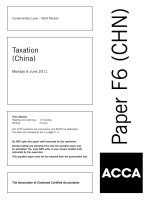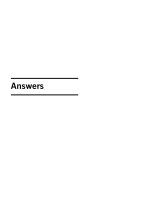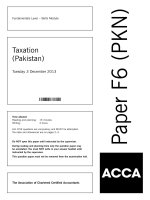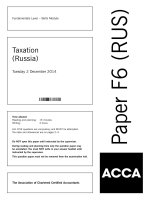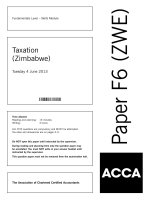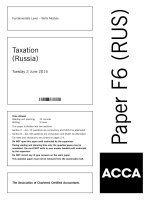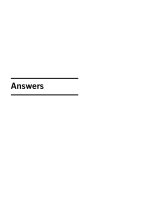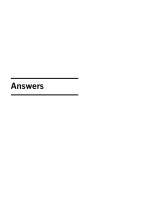ACCA f6 taxation vietnam 2011 dec question
Bạn đang xem bản rút gọn của tài liệu. Xem và tải ngay bản đầy đủ của tài liệu tại đây (114.93 KB, 13 trang )
Taxation
(Vietnam)
Tuesday 6 December 2011
Time allowed
Reading and planning:
Writing:
15 minutes
3 hours
ALL FIVE questions are compulsory and MUST be attempted.
Tax rates and allowances are on pages 2–3.
Do NOT open this paper until instructed by the supervisor.
During reading and planning time only the question paper may
be annotated. You must NOT write in your answer booklet until
instructed by the supervisor.
This question paper must not be removed from the examination hall.
The Association of Chartered Certified Accountants
The Ministry of Finance of the Socialist Republic of Vietnam
Paper F6 (VNM)
Fundamentals Level – Skills Module
SUPPLEMENTARY INSTRUCTIONS
1. Calculations and workings need only be made to the nearest VND, unless instructed otherwise.
2. All apportionments should be made to the nearest month.
3. All workings should be shown.
TAX RATES AND ALLOWANCES
The following tax rates and allowances are to be used in answering the questions
Value added tax (VAT)
Standard rate
Reduced rate
10%
5%
Corporate income tax (CIT)
Standard rate for enterprises
25%
Foreign contractor tax (FCT)
1.
2.
3.
1.
2.
3.
4.
5.
6.
7.
8.
9.
Value added rates as a percentage (%) of taxable turnover:
Services, leasing of machinery and equipment, and insurance.
(a) Construction and assembly and installation where the tender included
the supply of materials, machinery and equipment in the construction work.
(b) Construction and assembly and installation where the tender did not
include the supply of materials, machinery and equipment in the construction
work.
Transportation and other business and production.
Corporate income tax rates as a percentage (%) of taxable turnover:
Trading: distribution and supply of goods, raw materials, supplies,
machinery and equipment associated with services in Vietnam.
Services, lease of machinery and equipment, insurance.
Construction.
Other production or business activities and transportation (including
sea and air transportation).
Lease of aircraft, aircraft engines, aircraft spare parts and sea going vessels.
Reinsurance.
Assignments [transfer] of securities.
Loan interest.
Income from royalties.
%
50.1
30.1
50.1
30.1
%
1
5
2
2
2
2
0·1
10
10
Personal income tax (PIT)
Regular income tax rates for Vietnamese citizens and other residents in Vietnam
effective from 1 January 2009
Portion of
monthly assessable
income (VND million)
Up to 5
Over 5 to 10
Over 10 to 18
Over 18 to 32
Over 32 to 52
Over 52 to 80
Over 80
Tax rate
%
5
10
15
20
25
30
35
2
Net to gross calculator
N < 4,750,000
4,750,000 < N < 9,250,000
9,250,000 < N < 16,050,000
16,050,000 < N < 27,250,000
27,250,000 < N < 42,250,000
42,250,000 < N < 61,850,000
N > 61,850,000
Gross basis
G < 5,000,000
5,000,000 < G < 10,000,000
10,000,000 < G < 18,000,000
18,000,000 < G < 32,000,000
32,000,000 < G < 52,000,000
52,000,000 < G < 80,000,000
G > 80,000,000
G
G
G
G
G
G
G
%
5
10
15
20
25
30
35
=
=
=
=
=
=
=
Tax
T=
T=
T=
T=
T=
T=
T=
N/0·95
(N – 250,000)/0·9
(N – 750,000)/0·85
(N – 1,650,000)/0·8
(N – 3,250,000)/0·75
(N – 5,850,000)/0·7
(N – 9,850,000)/0·65
0·05G
0·1G – 250,000
0·15G – 750,000
0·2G – 1,650,000
0·25G – 3,250,000
0·3G – 5,850,000
0·35G – 9,850,000
Notes:
G: Gross income
N: Net income
T: Income tax
Personal deductions (per month):
Self
Dependant
VND4,000,000
VND1,600,000
Social insurance, health insurance and unemployment insurance:
Rates
Social insurance (SI)
Health insurance (HI)
Unemployment insurance (UI)
6%
1·5%
1%
Base salary (per month)
The based salary for Social Insurance, Health Insurance and Unemployment Insurance:
(1) From 1 January to 30 April 2010: VND13,000,000 per month
(2) From 1 May to 31 December 2010: VND14,600,000 per month
Rates of exchange
The following rates of exchange are to be used in answering all questions in this paper (unless
otherwise stated):
Euro 1 = VND28,000
USD1 = VND21,000
3
[P.T.O.
ALL FIVE questions are compulsory and MUST be attempted
1
The following clients have approached you for advice regarding corporate income tax (CIT) in 2010:
(a) Fortune-4ever Ltd (‘Fortune’) is a joint venture company established in Vietnam in 2007 in the field of customer
goods manufacturing.
Fortune is seeking advice with regard to the tax treatment of the following matters in their finalisation CIT return
for the fiscal year ended 31 December 2010:
(i)
Depreciation expense
Fortune is considering the appropriate tax depreciation expense for the following assets:
(1) An imported four-seat car purchased from a Vietnamese supplier on 1 January 2010. Fortune paid the
following amounts to the supplier:
–
purchase price of VND1,540 million, inclusive of 10% value added tax (VAT), of which 50% was
paid in cash; and
–
registration fee of VND300 million (exempt from VAT).
Fortune expects to use the car for five years.
(2) A machine purchased under a finance lease, which commenced from 1 July 2010. Fortune will pay
for the machine in ten equal instalments of VND50 million each over five years. The first payment will
be made on 31 December 2010, and the last payment on 30 June 2015. Immediately after the last
payment, Fortune will pay a nominal price to purchase the machine and then expects to sell it for a
nominal amount as scrap because the machine would have reached the end of its useful life by then.
Fortune also incurred costs of VND50 million to install the machine.
If Fortune had purchased the machine outright, it would have cost them VND400 million.
All amounts relating to the machine are stated exclusive of VAT.
(ii) Distribution expenses
Fortune incurred the following advertising and promotion expenses during the year, which it accounted for
under the heading ‘distribution expenses’. Valid invoices and supporting documents are available in all
cases, unless otherwise stated below.
4
Item Type of expense
1
2
3
4
5
6
7
8
9
10
11
12
Amount
excluding VAT
VND million
Discount for customers who buy large quantities of goods, of which:
– Discount as a reduction on invoice
– Discount in cash, as one of its dealer’s was liquidated and would not receive
any further invoice. This cash payment is not supported by any voucher.
Cost of goods given free in a ‘buy two get one free’ promotion campaign for a new
product. The promotion campaign was duly registered with the authorities.
Commissions paid to Fortune’s sales force.
Payment discount.
Cost of market research and analysis paid to a consulting firm for a new product to
be launched by the end of 2011.
Cost of an overseas tour booked at a travel agency for Fortune’s highly performing
distributors.
Costs charged by distributors for hiring promoters and speakers to promote
Fortune’s products in the distributors’ outlets.
Rental for booths and outlets at festivals.
Display fees for band-rolls of Fortune’s products at shops and supermarkets.
Support costs paid to distributors for the travel expenses of the distributor’s sales
forces.
Costs of organising customer conferences.
Costs of Fortune’s sample products to be given free to customers at the above
conferences. Fortune advanced the whole of this amount but sought reimbursement
for 40% of it from the distributors. Fortune duly registered this free-sample
distribution with the authorities.
1,500
100
400
2,000
250
300
2,500
200
600
1,200
350
650
400
Required:
Advise Fortune-4ever Ltd of the corporate income tax (CIT) treatment of each of the following items in the
year ended 31 December 2010:
(i)
The deductible depreciation expenses for the car;
(ii) The deductible depreciation expenses for the machine purchased under the finance lease;
(4 marks)
(4 marks)
(iii) The amounts of distribution expenses that will be deductible, deductible but subject to a cap and
non-deductible.
(10 marks)
Notes:
1. You should base your answer on the guidance for tax finalisation for the year 2009.
2. Calculations need only be made to the nearest VND million.
5
[P.T.O.
(b) VCM JSC (‘VCM’), a Vietnamese joint stock company, has an investment project named ‘VP’ in a specially
encouraged geographical area. VCM is entitled to a CIT exemption for income from this project in the year ended
31 December 2010. Apart from this project, VCM also has other sources of income from other projects which
are not entitled to tax incentives, and from real property transfers. VCM has provided the following summary of
its income (in VND million) for the year ended 31 December 2010:
VP project
Taxable revenue (exclusive of the items
specified below)
Deductible expenses (exclusive of the
items specified below)
Waste disposal gain/(loss)
Unrealised foreign exchange gain from
translation of payables
Unrealised foreign exchange loss from
translation of payables
Unrealised foreign exchange gain from
translation of receivables
Unrealised foreign exchange loss from
translation of receivables
Gain from securities trading
Interest income
Interest expenses
Other
projects
Transfers of Not attributable
real property to any project
600,000
200,000
500,000
(400,000)
20,000
(240,000)
(350,000)
(10,000)
50,000
(30,000)
5,000
(3,000)
25,000
3,000
(2,000)
VCM’s results for the year 2009 were as follows:
VP project
2009
(40,000)
Other
projects
(45,000)
Transfers of
real property
(10,000)
Required:
Calculate the corporate income tax (CIT) payable by VCM JSC for the year ended 31 December 2010.
Notes:
1. You should base your answer on the guidance for tax finalisation for the year 2009.
2. Calculations need only be made to the nearest VND million.
(12 marks)
(30 marks)
6
This is a blank page.
Question 2 begins on page 8.
7
[P.T.O.
2
Ms Bich Hanh, a Vietnamese citizen, is 50 years old and a partner in the Vietnam law firm MKB. MKB has two other
partners apart from Ms Hanh, and 100 employees in two offices in Hanoi and Ho Chi Minh City. From 1 January
2010, Ms Hanh was relocated from Hanoi to Ho Chi Minh City to be in charge of the office there. Ms Hanh received
the following remuneration and benefits from MKB during 2010:
–
Salary: VND1,300 million (including a 13th month bonus).
–
Performance bonus: VND600 million.
–
Support tuition fee for her son, who is 18 years old and studying in a school in the US: USD20,000.
–
Tuition fee for her daughter, who is 16 years old and studying in an international school in Vietnam:
VND378 million.
–
A private car for her own use: The total costs paid for the car by MKB in 2010 were VND120 million, and a
reliable estimated allocation of her use of the car was: 20% for transportation between her home and firm’s office;
50% for the firm’s business; and 30% for her private usage.
–
Gym group membership card: MKB paid VND567 million to purchase the card which can be used for three years.
The card is jointly used by the firm’s three partners, whose names are clearly stated on the card and cannot be
used by anyone else.
–
An apartment in Ho Chi Minh City rented for her by MKB at a cost of VND31·5 million per month.
–
MKB employed a part-time tax accountant to help prepare personal income tax returns for the firm’s compliance.
The total cost of the tax accountant’s services in 2010 were VND120 million but this cost cannot be allocated
to any specific person. Ms Hanh also asked the accountant to help prepare her individual finalisation income tax
return in 2009 and gave the accountant a mobile phone which had cost VND6 million as a gift in return for these
services.
–
As 2010 is the fifth year that Ms Hanh has worked for MKB, she was awarded a ‘loyalty gift’ of a 15-day tour
for two (Ms. Hanh and her husband) to the US which cost VND100 million per person at the end of 2010. The
firm paid the full tour cost directly to the travel agent. Ms Hanh extended her trip for another ten days to meet
with clients in the US (three days) and to visit her son (seven days), at a cost of USD5,000. Ms Hanh settled
all of the costs for the extension to her trip using the firm’s corporate credit card, which MKB recorded as an
advance to her because she had committed to pay back the whole amount to the firm.
–
Ms Hanh’s remuneration package from MKB is gross of tax and compulsory insurance payable on her part.
Ms Hanh’s husband, Mr Quang, who is 61 years old, is a freelance real estate investor. He used to be very successful,
but due to the market situation in 2010, he did not have any real estate transactions during the year. The total market
value of the real estate assets Mr Quang currently holds is VND20,000 million, all of which are in the construction
stage.
Ms Hanh’s mother and father are 70 and 75 years old, respectively, and live with her and her family. In 2010, her
parents did not have any income except for a remittance of USD10,000 from Ms Hanh’s brother who lives in the US.
The money was remitted to Mr Hanh’s father, who converted all of the money to VND in order to invest in BTB, a
share listed in the stock market. Unfortunately, due to a fraud, BTB shares were removed from the market at the end
of 2010, and Mr Hanh’s father had to sell all of the shares purchased at a total loss of VND200 million.
In July 2010, Ms Hanh’s daughter was invited to act in a short advertising clip, for which she received
VND5·8 million.
8
Required:
(a) State the conditions for family deduction (relief) for children, spouses and parents.
(7 marks)
(b) For each person in Ms Hanh’s family, state, giving reasons, whether he/she would be treated as a dependant
of Ms Hanh, and calculate the total amount of personal deductions (reliefs) that Ms Hanh can claim in her
personal income tax return.
Note: you should assume that Ms Hanh had provisionally registered all of her family members as dependants
at the beginning of the year.
(5 marks)
(c) Calculate the personal income tax (PIT) that Ms Hanh is liable to pay for the year 2010.
Note: you should list all of the items mentioned in the question, indicating with ‘0’ those items which are not
taxable.
(13 marks)
(25 marks)
9
[P.T.O.
3
HNSN, a Korean construction company, is negotiating a contract with AHN JSC, a Vietnamese joint stock company,
for a turnkey project for the construction of and equipment supply for a paper mill in Thai Nguyen Province. Based
on HNSN’s budget, they intended to quote the following price in the contract:
Item
Machinery and equipment supplied to the mill
Design of the mill
Construction of the mill and installation of the machinery and equipment
Supervision of construction and installation
Commission, testing and warranty
Training services for key staff of AHN in operating the mill
Amount
USD million
80
7
10
4
1·2
0·5
The above contract price is calculated based on HNSN’s intention to negotiate with AHN that AHN will be responsible
for all foreign contractor tax (FCT) payable in Vietnam.
A part of the construction works, with the value of USD8 million (exclusive of value added tax (VAT)) will be
sub-contracted to a local supplier. In calculating the construction price of USD10 million, HNSN has taken into
account the impact of the VAT at 10% that will be charged by the local supplier.
The machinery and equipment will be imported from Korea with AHN as the importer of record, while all the other
activities (including training) will be carried out by HNSN’s personnel in Vietnam.
HNSN has estimated that it will take two years to complete the construction and so due to its length, the project will
constitute a permanent establishment (P/E) of HNSN in Vietnam. Based on its experience in operating in other
developed countries, HNSN believes that the project constituting a P/E will have the following consequences:
1.
HNSN will be required to file corporate tax returns for VAT and corporate income tax (CIT) in a similar manner
as a company incorporated in Vietnam; and
2.
It may not be possible to apply for an exemption from income tax for the profits earned from the project under
the double tax treaty (DTA) between Korea and Vietnam.
According to Article 7 of the DTA between Korea and Vietnam, where a foreign company has a P/E in Vietnam, the
profits attributable to that P/E may be taxed in Vietnam.
In addition, HNSN is concerned about the tax implications of the different methods of tax filing for the project in
Vietnam. HNSN would like to use the deemed method for filing for FCT but does not know if this will be permitted.
Required:
(a) Briefly advise HNSN of the consequences for having a permanent establishment (P/E) in Vietnam. You should
specifically address HNSN’s concerns about its corporate tax filing requirements and the applicability of any
tax treaty (DTA) exemption.
(9 marks)
(b) During the contract negotiations, AHN requested HNSN to quote a revised price for the contract, on the basis
that AHN will bear the VAT and HNSN will bear the CIT portion of the FCT (i.e. a price gross of CIT and net of
VAT).
Assuming that HNSN will use the deemed method of filing for foreign contractor tax (FCT), calculate the
revised total contract price (gross of CIT and net of VAT) as requested by AHN JSC, together with the total
tax cost to HNSN based on this contract price.
Note: calculations should be made in USD.
(7 marks)
10
(c) AHN and HNSN have decided to enter into the contract using the revised contract price (i.e gross of CIT and net
of VAT, as calculated in (b) above), but HNSN now thinks that it would be better for it to apply the hybrid method
for FCT declaration purposes.
Calculate the value added tax (VAT) and corporate income tax (CIT) portions of the foreign contractor tax
(FCT) that will be payable by HNSN if it uses the hybrid method for FCT declaration purposes and advise
HNSN if they are correct in believing that this method will result in a lower total tax cost for them.
Notes:
1. You should assume that the VAT rate for all the activities conducted by HNSN is 10%.
2. Calculations should be made in USD.
(4 marks)
(20 marks)
11
[P.T.O.
4
(a) Circular 153/2010/TT-BTC dated 28 September 2010 (Circular 153) provides detailed guidance on the issuance
and usage of invoices.
Required:
(i)
State the types of invoices (as stipulated in Circular 153) that the seller is required to issue in each of
the following cases:
Case 1: Company A sold goods to Company B. Both companies are incorporated in Vietnam and are
deduction method taxpayers.
Case 2: Company A provided marketing services for Company C, a Hong Kong Company. Company C
has no permanent establishment or entity presence in Vietnam.
Case 3: Company D sold foreign currency to Company A for making an overseas payment for imported
goods. Company D is licensed for foreign currency trading.
Case 4: Company E, acting as an agent for Company Z, a foreign airline, collected freight from Company
A for international transportation.
Case 5: Company F, the operator of a circus, sold tickets to customers for a show.
(5 marks)
(ii) Describe the THREE allowable forms of invoices to be used by business establishments for their sales.
(4 marks)
(b) Describe the THREE cases, as stipulated in Circular 129/2008/TT-BTC dated 26 December 2008 on value
added tax (VAT), where settlements for goods and services with a transaction value in excess of
VND20 million are deemed as being made via a bank in order for the input VAT to be deductible, despite
the buyer not actually paying the seller via a bank.
(3 marks)
(c) Explain, in each of the following cases, the value added tax (VAT) and corporate income tax (CIT) implications
(if any) of the input VAT amount:
(i)
A villa that a life insurance company purchased to use as its head office.
(ii) A villa constructed by a construction company to use as a sample for customers’ consideration, which
was destroyed by fire before it could be used. The villa was insured for fire, and the insurance company
agreed to pay a compensation amount which covered all of the costs (including VAT) of constructing the
villa.
(iii) A villa that a construction company constructed and then sold to its chief executive officer (CEO) at a
significant discount below its market value as a reward for his excellent past performance. (3 marks)
(15 marks)
12
5
Mai Hoang Co (MHC) is the parent of a group of companies. MHC is located in Hanoi and it has a dependent
manufacturing unit in Vinh Phuc province for production of consumer goods; various dependent units being sales
offices in various provinces; a subsidiary in Ho Chi Minh City, in which it holds 90% of the shares; a subsidiary in
Dong Nai, in which it holds 100% of the shares; and a joint venture in Quang Ninh with a foreign partner in which
it holds 51% of the shares.
All the companies and branches in the group have a fiscal year end of 31 December, except for the Dong Nai
subsidiary, which has a year end of 31 March.
On 1 December 2010, MHC concluded a contract to purchase the remaining 49% of the shares in the Quang Ninh
joint venture from the foreign partner. The shareholding transfer is not required to be approved by the authorities.
Required:
Advise Mai Hoang Co of the corporate income tax (CIT) filing obligations in respect of:
(i)
Mai Hoang Co itself for the year ended 31 December 2010;
(ii) its dependent manufacturing units for the year ended 31 December 2010;
(iii) its other dependent sale offices for the year ended 31 December 2010;
(iv) its subsidiary in Ho Chi Minh City for the year ended 31 December 2010;
(v) its subsidiary in Dong Nai for the year ended 31 March 2011; and
(vi) its purchase of the 49% shareholding in the Quang Ninh joint venture on 1 December 2010.
Note: In each case you should state the types of tax returns to be submitted, the tax authority to which the returns
should be submitted and the time for submission of each return. You are not required to quote the form number
of the return.
(10 marks)
End of Question Paper
13
